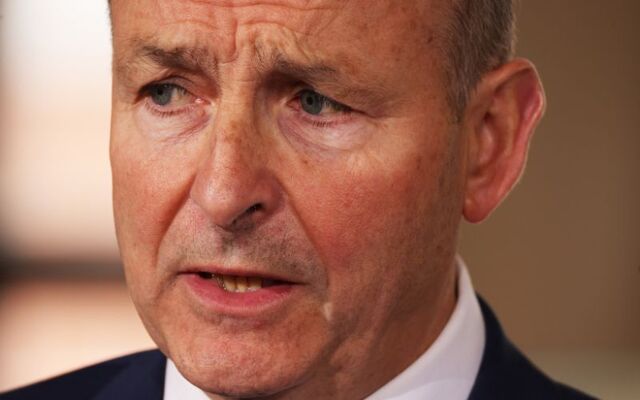Update: A spokesperson for Ireland's Department of Foreign Affairs told IrishCentral on Tuesday: "By intervening in a case at the ICJ, Ireland is setting out to the Court its interpretation of the Convention in question in the case.
"It is important for the Court, in its consideration of any multilateral convention, to understand how other parties to that convention interpret and apply it."
EARLIER
Ireland filed its declaration of intervention yesterday, Monday, January 6, in the genocide case taken by South Africa against Israel at the International Court of Justice (ICJ).
South Africa launched its "Application of the Convention on the Prevention and Punishment of the Crime of Genocide in the Gaza Strip ('South Africa v Israel')" in the ICJ in December 2023.
Having announced its intention to intervene in March 2024, Ireland filed its declaration of intervention in the case on Monday.
The declaration was signed by Ann Derwin, Ireland's Ambassador to The Netherlands, where the ICJ is based in The Hague.
As a party to the UN's 1948 Convention on the Prevention and Punishment of the Crime of Genocide (“Genocide Convention"), Ireland has a right to intervene in South Africa's case as per Article 63 of the Statute of the ICJ.
In its declaration of intervention, Ireland says that it considers that “Articles I, II, III, IV, V and VI of the [Genocide] Convention are in question."
Ireland offers its interpretation of Articles I, II, and III of the Genocide Convention in its declaration.
The ICJ said in a statement on Tuesday that in accordance with Article 83 of the Rules of Court, South Africa and Israel have been invited to furnish written observations on the declaration of intervention.
The declaration filed by Ireland in the ICJ on Monday says in part: "Ireland is acutely sensitive to the context within which these proceedings have been
initiated.
"The heinous terror attack perpetrated by Hamas against Israel on 7 October 2023 was reprehensible and Ireland has condemned and continues to condemn it unequivocally.
"The murder of civilians, destruction of civilian property, taking and keeping of hostages including children, use of human shields and the firing of indiscriminate rockets at urban centres constitute serious violations of international humanitarian law for which those involved must be held accountable.
"It is unconscionable that hostages remain in captivity after more than fourteen months. Ireland has consistently called for their immediate and unconditional release.
"Ireland recognises, also, the deep hurt and sorrow that this attack caused and continues to cause for the Government and people of Israel."
On December 29, 2023, the ICJ announced that South Africa had filed an application instituting proceedings against Israel, alleging that Israel "in relation to Palestinians in Gaza, is in violation of its obligations under the Genocide Convention.”
The following month, the ICJ ordered that Israel take measures to prevent genocide in Gaza and enable the provision of basic services and humanitarian assistance in the Gaza Strip. Israel was also ordered to submit a report to the ICJ in one month outlining its efforts to adhere to the ICJ's orders.
Tánaiste Micheál Martin "strongly welcomed" the ICJ's orders.
"These are measures that Ireland has been consistently calling for from the start of this conflict," he said on January 26.
He added that the Government would "strongly consider intervention in the case" and that he asked his officials to "prepare legal advice for my consideration on an urgent basis."
The Tánaiste later announced in March that Ireland would intervene in the case, though acknowledged that the intervention required government approval which could take months.
In May, Ireland, in concert with Spain and Norway, formally recognized Palestine "as a sovereign and independent state" and agreed to establish full diplomatic relations between Dublin and Ramallah.
On December 11, the Tánaiste confirmed that the Irish Government approved Ireland's intervention.
Announcing the Government's approval, the Tánaiste said: "There has been a collective punishment of the Palestinian people through the intent and impact of military actions of Israel in Gaza, leaving 44,000 dead and millions of civilians displaced.
"By legally intervening in South Africa’s case, Ireland will be asking the ICJ to broaden its interpretation of what constitutes the commission of genocide by a State.
"We are concerned that a very narrow interpretation of what constitutes genocide leads to a culture of impunity in which the protection of civilians is minimised.
"Ireland’s view of the Convention is broader and prioritises the protection of civilian life – as a committed supporter of the Convention, the government will promote that interpretation in its intervention in this case.
"Intervening in both cases demonstrates the consistency of Ireland’s approach to the interpretation and application of the Genocide Convention.”
Days later, Israel announced it would be closing its Embassy in Dublin, accusing Ireland of being "antisemitic," charges which Irish leaders continue to vehemently deny.




Comments